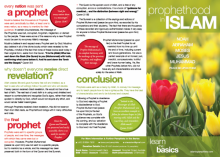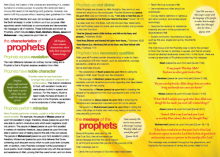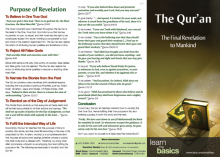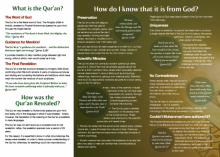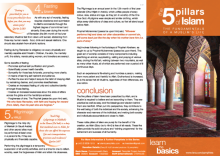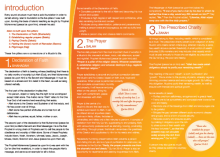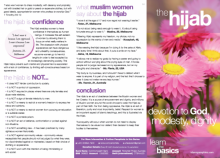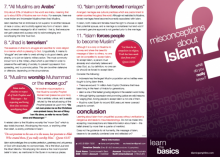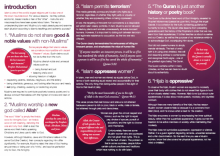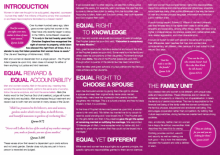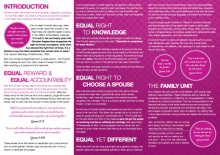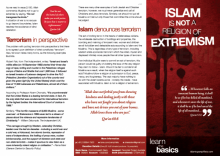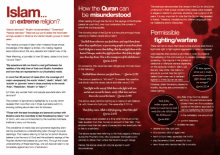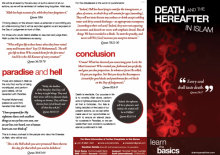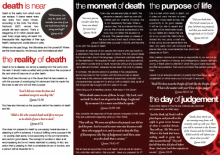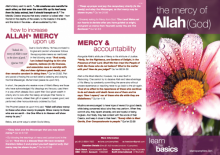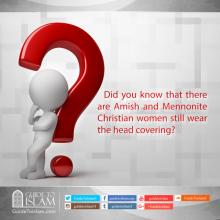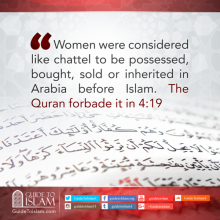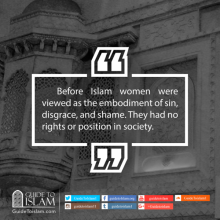-

GuideToIslam
Prophethood in Islam
Allah, the Most Merciful and Just, did not leave us to wander the Earth aimlessly. In order to inform us of our purpose, Allah appointed certain individuals to communicate and demonstrate His message to all of mankind.
-

GuideToIslam
Prophethood in Islam II
Allah gave all Prophets certain characteristics in order for them to successfully fulfil their mission, such as persistence, courage, leadership, patience and wisdom.
-

GuideToIslam
The Qur’an – The Final Revelation
The Qur’an is the literal word of God, The Almighty (Allah in Arabic), revealed to Prophet Muhammad (peace be upon him) through the Angel Gabriel.
-

GuideToIslam
The Quran – The Final Revelation to Mankind II
The Qur’an is the last scripture revealed by Almighty Allah (God), confirming what little truth remains in parts of previous scriptures and refuting and correcting fabrications and additions which have crept into current day versions of such scriptures.
-

GuideToIslam
The Five Pillars of Islam
The five pillars of Islam have been prescribed by Allah, and a Muslim is required to believe and act according to them. They are practical as well as easy, and the blessings and wisdom behind them are manifold.
-

GuideToIslam
The Five Pillars of Islam II
These noble pillars of Islam are purely for the benefit of His creation, as Allah (Glory be to Him!) is free of all needs. These five pillars provide the solid structure and ‘training programme’ for the betterment and success of all humanity.
-

GuideToIslam
The Hijab
The word Hijab comes from the Arabic root word ‘Hajaba’, which means to conceal or cover. In an Islamic context, Hijab refers to the dress code required for Muslim females who have reached puberty. Hijab is the requirement of covering or veiling the entire body with the exception of the face and hands.
-

GuideToIslam
The Hijab II
Islam promotes modesty and decency and seeks to minimise immorality within society. The Hijab, amongst other things, helps attain this goal.
-

GuideToIslam
Misconceptions About Islam
Islam is one of the world’s largest religions yet it is also one of the most misunderstood. For various reasons – be they political, economic, biased media or fear of the “other” – mistruths and misconceptions have been spread about Islam. The key to understanding Islam and Muslims is to resist stereotypes and examine each situation according to Islamic teachings and authentic sources.
-

GuideToIslam
Misconceptions About Islam II
Muslims worship the same God worshipped by Prophets Noah, Abraham, Moses and Jesus. The word “Allah” is simply the Arabic word for Almighty God – an Arabic word of rich meaning, denoting the one and only God. Allah is also the same word that Arabic speaking Christians and Jews use to refer to God.
-

GuideToIslam
Women’s Rights in Islam II
Women in Islam are thought to be subjugated, degraded, oppressed – but are they really? Are millions of Muslims simply that oppressive or are these misconceptions fabricated by a biased media?
-

GuideToIslam
Science in Islam II
Islam encourages reflection and scientific research because understanding the nature of creation enables people to further appreciate their Creator and the extent of His power and wisdom.
-

GuideToIslam
Islam is not a Religion of Extremism
The media’s portrayal of Islam often misleads those whose knowledge of the religion is limited, into making negative assumptions about this very peaceful and tolerant way of life.
-

GuideToIslam
Islam is not a Religion of Extremism II
The media’s portrayal of Islam often misleads those whose knowledge of the religion is limited, into making negative assumptions about this very peaceful and tolerant way of life.
-

GuideToIslam
Death & the Hereafter in Islam
Death is not a disaster, but simply a passing from this world onto the next. It should make us reflect and ponder about the purpose of life, and what will become of us after death.
-

GuideToIslam
Death & the Hereafter in Islam II
Death is inevitable. Our purpose in life is to worship Allah alone, perform acts of righteousness and to avoid all that is forbidden.
-

GuideToIslam
The Mercy of Allah (God)
Muslims are encouraged to have hope of reward for good deeds, while being concerned about sins they may perform. When they commit sins, they repent sincerely, and are hopeful of being forgiven.
-

GuideToIslam
hijab in christianity
Did you Know that there are Amish and Mennonite Christian women still wear the head covering?
-

GuideToIslam
Status of Women before Islam
Women were considered like chattel to be possessed, bought, sold or inherited in Arabia before Islam. The Quran forbade it in (4:9).
-

GuideToIslam
Women before Islam
Before Islam women were viewed as the embodiment of sin disgrace and shame. They had no rights or position in society.
This Article not found.
